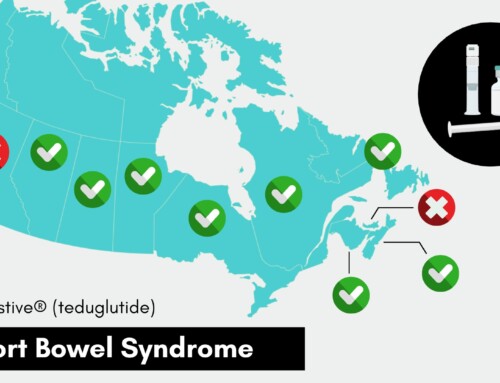New biologic treatment for ulcerative colitis ENTYVIO™ (vedolizumab) now available in Canada after key work by Canadian researchers
ENTYVIO™ brings a new targeted approach to treating a disease that affects over 125,000 Canadians.
News Release by Takeda Canada.
Oakville, ON – May 19, 2015 – ENTYVIO™ (vedolizumab), a new biologic treatment to treat ulcerative colitis (UC), one of the two most common types of inflammatory bowel disease, is now available in Canada.
UC is a condition that can be very debilitating and significantly compromise quality of life for the patient and affects more than 125,000 Canadians. Additionally, inflammatory bowel disease has been labelled Canada’s “national disease” due to Canada having among the highest rates in the world.
ENTYVIO™ is the first and only gut-selective biologic therapy with no known systemic immunosuppressive effects and the only biologic treatment approved for use in UC patients who have had an inadequate response, loss of response or were intolerant to infliximab, a TNFα antagonist. ENTYVIO™ works by targeting the gut, directly reaching inflammation that causes symptoms of UC. In clinical studies, ENTYVIO™ demonstrated statistically significant benefits versus placebo over a year-long trial in patients who had failed previous treatments, including biologics. After 52 weeks, of those on ENTYVIO™ 57% had durable clinical response (vs. 24% on placebo, p<0.0001) and 42% had clinical remission (vs. 16% on placebo, p<0.0001).
“Ulcerative colitis continues to be a growing problem in western countries, particularly in Canada. The prevalence of UC in our country is growing and treatments that are currently available are not universally effective,” said Dr. Remo Panaccione, Professor in the Department of Medicine at the University of Calgary and Director of the inflammatory bowel disease clinic. “We’ve come a long way in treating this disease but we need something new and different to help address the ongoing gap. The arrival of ENTYVIO™ is important and exciting for physicians and patients because it is a whole new type of therapy. It selectively targets the gut, meaning it is taking on the disease head-on with no known systemic immunosuppressive effects, potentially leaving less room for side effects.”
Previously approved biologic treatments for UC are all inhibitors of tumour necrosis factor (TNF)-alpha. While they have been an important treatment advance for a number of inflammatory conditions, there are a significant number of patients who are intolerant to anti-TNF-alpha treatment or for whom response is inadequate or is lost over time.
“Ulcerative colitis is a lifelong disease that can significantly affect a patient’s quality of life at home, school and work. This is especially true when treatments stop working. Often the only remaining option is surgery to remove parts of the bowel, which can have a major impact on health, lifestyle and emotional well-being,” said Mina Mawani, President and CEO, Crohn’s and Colitis Canada. “We are excited that research has led to the development of a new treatment option that works differently. More options means more hope and a better life for people living with ulcerative colitis. We have been anticipating the arrival of this new treatment and are pleased that it is finally available to Canadians. We will continue to work with all levels of government to ensure that all patients get the help they need when they need it.”
“Health Canada’s approval of ENTYVIO™ is important progress in the treatment of ulcerative colitis. This disease affects individuals of all ages, many of whom are in early adulthood, finishing school, or just beginning their careers when they receive the diagnosis,” said Gail Attara, Co-founder, President and CEO, Gastrointestinal Society. “We trust that decision-makers within government drug programs will recognize the seriousness of this disease and that they will respond by quickly adding ENTYVIO™ as a reimbursed medication for those who need this option to treat ulcerative colitis.”
A Canadian research milestone
The Health Canada approval is a milestone for the Canadian medical research community because of the pivotal role played by Canadian researchers in the treatment’s early discovery and development. Researcher Dr. Andrew Lazarovits of London, Ontario, developed a first potential molecule for this type of therapy while working in Boston but passed away in 1999 at age 44.
His work was taken up by others, resulting in the development of vedolizumab and eventually international clinical trials financed by Takeda which were led by Dr. Brian Feagan, director of Robarts Clinical Trials at the Robarts Research Institute in London, Ontario. The treatment was first used on an ulcerative colitis patient at University Hospital in London and Dr. Feagan was the lead author of the publication of the trial results in The New England Journal of Medicine in 2013.
“The approval of ENTYVIO™ in Canada to treat ulcerative colitis is particularly significant for us in London, Ontario, given our role in its early clinical trials and the early discovery work in this area of our late colleague, Dr. Andrew Lazarovits,” said Dr. Feagan. “We are very pleased that Canadian patients will now have the opportunity to get the benefits from ENTYVIO™ that we have seen in our clinical studies. It’s an important addition to the treatments for this debilitating disease.”
ENTYVIOTM dosing, efficacy and safety
ENTYVIO™ (vedolizumab) is indicated for the treatment of adult patients with moderately to severely active ulcerative colitis who have had an inadequate response, loss of response to, or were intolerant to either conventional therapy or infliximab, a TNFα antagonist. The recommended dose regimen of ENTYVIO™ is300 mg administered by intravenous infusion at zero, two and six weeks and then every eight weeks thereafter.
The safety and efficacy of ENTYVIO™ for the treatment of adult patients with moderately to severely active ulcerative colitis was demonstrated in GEMINI I, a randomized, double-blind, placebo-controlled trial. Patients enrolled in the trial had failed at least one conventional therapy, including corticosteroids, immunomodulators and/or infliximab, a TNFα antagonist. Approximately 40% of the overall population in GEMINI I had failed prior infliximab. After 52 weeks, of those on ENTYVIO™ 42% had clinical remission (vs.16% on placebo, p<0.0001), 57% had durable clinical response (vs. 24% on placebo, p<0.0001) and 52% showed improvement of the endoscopic appearance of the mucosa (vs. 20% on placebo, p<0.0001). This beneficial effect was seen both in patients who had previously used a TNFα antagonist and those who had not.
The ENTYVIO™ tolerability profile was demonstrated in GEMINI I. Over 52 weeks, 12% of those treated with ENTYVIO™ had serious adverse events, compared to 11% on placebo. Discontinuation rates due to adverse events were 6% for those on ENTYVIO™ and 11% for those on placebo. This safety profile has been confirmed with clinical experience to date in more than 3,300 individuals.
YOURVANTAGE™ patient support program
In conjunction with the approval of ENTYVIO™, Takeda Canada Inc. is launching a patient support program called YOURVANTAGE™ which will be operated by Takeda’s partner, Innomar Strategies. All patients prescribed ENTYVIO™ will be enrolled in YOURVANTAGE™. The program will arrange convenient times and locations for them to receive the treatment by intravenous infusion at one of the Innomar clinics across Canada. It will also provide patients with information about their disease, the treatment and advice about securing insurance reimbursement. For more information, visit www.yourvantage.ca.
About ulcerative colitis
More than 125,000 Canadians are living with UC, which causes the tissue of the large intestine (including the colon and rectum) to become inflamed, form sores and bleed easily. Along with symptoms of abdominal pain, cramping, diarrhea, nausea and vomiting, UC can cause severe complications including intestinal bleeding and bowel obstructions. Sometimes a portion of the bowel needs to be surgically removed to bring patients relief. The exact cause of IBD is not entirely understood, though it is believed to result from an interaction between genes and the body’s immune system, with environmental factors possibly playing a role.
About Takeda Canada
Takeda Canada, located in Oakville, Ontario, is the Canadian sales and marketing organization of Takeda Pharmaceutical Company Limited, Osaka, Japan. The company has a commercial presence covering more than 70 countries, with particular strength in Asia, North America, Europe and fast-growing emerging markets including Latin America, Russia-CIS and China. Areas of focus include cardiovascular and metabolic, oncology, respiratory and immunology, central nervous system, general medicine, and vaccines. Takeda is a research-based global company with its main focus on pharmaceuticals. As the largest pharmaceutical company in Japan and one of the global leaders of the industry, Takeda is committed to strive towards better health for people worldwide through leading innovation in medicine. Through strategic acquisitions, Takeda has been transforming
itself, broadening its therapeutic expertise and geographic outreach. Additional information about Takeda Canada is available through its website: www.takedacanada.com.




















